Objects Κέντρον Ερεύνης Ελληνικής Φιλοσοφίας
<< 10
10 >>
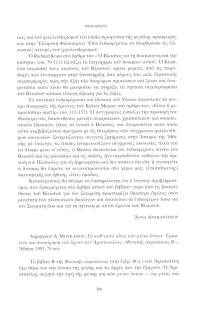
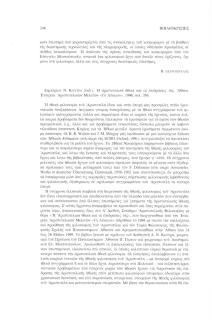
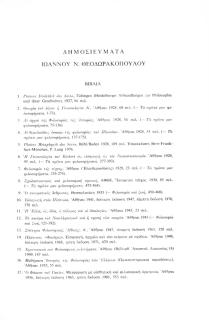
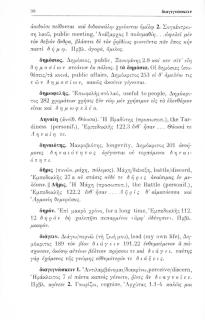
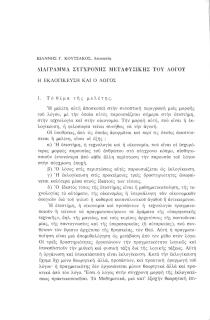
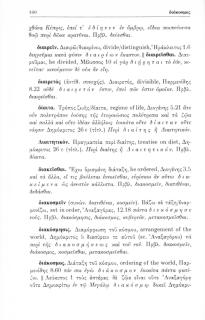
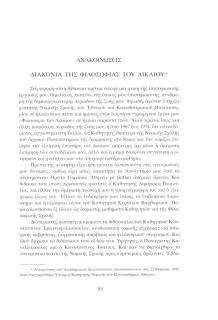
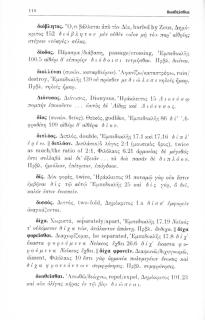
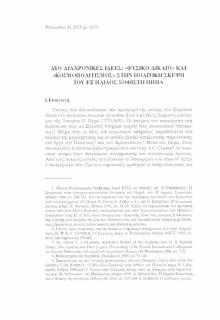

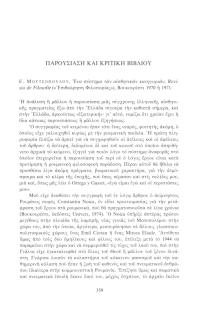
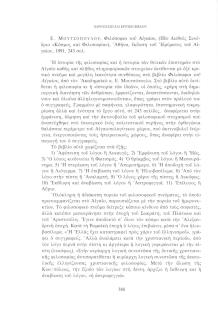 << 10
10 >>
<< 10
10 >>
Total: 4244

Δημητρίου Δ. Μουκάνου, Τα καθ΄αυτώ αίτια των φύσει όντων. Ερμηνεία και διασάφηση του έργου του Αριστοτέλους «Φυσικής ακροάσεως Β.», Αθήνα 1993, 79 σελ.
Ενότητα: Άρθρα του περιοδικού "Φιλοσοφία"
Δεν υπάρχει περιγραφή
Δημητρίου Ν. Κούτρα (εκδ.), Η αριστοτελική ηθική και οι επιδράσεις της, Αθήνα, Εταιρεία Αριστοτελικών Μελετών «Το Λύκειον», 1996, σελ. 356
Ενότητα: Άρθρα του περιοδικού "Φιλοσοφία"
Δεν υπάρχει περιγραφή
Δημοσιεύματα Ιωάννη Ν. Θεοδωρακόπουλου
Ενότητα: Άρθρα του περιοδικού "Φιλοσοφία"
Δεν υπάρχει περιγραφή
Δηναίη
Ενότητα: Λεξικό Προσωκρατικής Φιλοσοφίας
Η Βραδύτης
Διάγραμμα σύγχρονης μεταφυσικής του λόγου. Η εκλογίκευση και ο λόγος
Ενότητα: Άρθρα του περιοδικού "Φιλοσοφία"
The underlying assumptions, which are expanded in this essay, are the following: (a) Science, Technology and Economics, nowadays the prevalent forms of human activity, exemplify more than any other case the Logos. (b) Logos in this case manifests itself as rationalization (c) This rationalization may be seen clearly in the ideal types of the above mentioned forms of activity. (d) The ideal type of science is mathematisation, of the technology full-automation and of economics the over-satisfaction of all economic needs. These ideal types, directly or indirectly, coincide with the image of the «supernatural technology» -i.e. sorcery-and with the main archetypes of religion, which the essence of God, namely omniscience, omnipotence and self-sufficiency. The realization of these ideal types or the coming close to such a realization, is no far as it entails a substitution of the mythical or natural order by a rational one, may be seen as rationalization. At the same time it may be seen as demythologizing (Entmythologisierung) on account of...
Διαιτητικόν
Ενότητα: Λεξικό Προσωκρατικής Φιλοσοφίας
Πραγματεία περί διαίτης
Διακονία της Φιλοσοφίας του Δικαίου
Ενότητα: Άρθρα του περιοδικού "Φιλοσοφία"
Konstantinos Despotopoulos widmete einen großen Teil seiner Schaffenskraft der Forschung der Rechtsphilosophie. Im vorliegenden Vortrag stellt er sowohl die Stadien seiner geistigen Entwicklung als auch seine wissenschaftliche Œuvre im Fachbereich "Rechtsphilosophie" übersichtlich dar. Im ersten Teil des Vortrags erwähnt er die Stationen seines Lebens, die sich entscheidend für seine Paideia und sein Schaffen erwiesen: Als Student an der Jurististischen Fakultät der Universität Athen nahm er an den Seminaren von P. Kanellopoulos und K. Tsatsos teil, und parallel zum Jurastudium vertiefte er in die Philosophie Piatons, Aristoteles΄, Kants und in die gegenwärtige Philosophie. Es folgte die Promotion (1939) mit dem Thema «Der Begriff des subjektiven Rechts», die unter den juristischen Kreisen hohe Anerkennung fand. Mit seiner Habilitation (1945) mit dem Thema «Die determinative Funktion des Rechts» erhielt er die venia legendi und lehrte er vom selben Jahr an bis 1947 als Privat Dozent Rechtsphilosophie an der Universität Athen. In der Folgez...
Διόνυσος
Ενότητα: Λεξικό Προσωκρατικής Φιλοσοφίας
Διόνυσος
Δύο διαχρονικές ιδέες: «Φυσικό δίκαιο» και «Κοσμοπολιτισμός» στην πολιτική σκέψη του εξ Ήλιδος Σοφιστή Ιππία
Ενότητα: Άρθρα του περιοδικού "Φιλοσοφία"
The preceding analysis of Hippias' fragments (collection DK) leads to the following deductions: a. Hippias, being the main representative of the 5th century B.C. Sophist movement and acting both as a thinker and a politician, stands as a forerunner of the Renaissance type of the «homo universalis». b. In order to interpret this Sophist's view on natural law, we clarified by means of examining the relevant texts and using modern terms of political philosophy the concept of «natural law», which is associated to the «unwritten law», which has divine origin or is said to put forward a long, undetermined history. c. We also showed that Hippias, when discussing with Socrates in Xenophon' s Memorabilia argued in favour of the «natural law» using two main arguments: (i) it remains unaltered and becomes synonymous to the «discovery of true existence» (ontos exeuresis). (ii) In contrast to the conventional law, it does not involve violence and guarantees universal equality and justice. d. Relying on natural equality and affinity, Hippias support...
Δῆρις
Ενότητα: Λεξικό Προσωκρατικής Φιλοσοφίας
Η Μάχη
Ε. Μουτσόπουλου, Ένα σύστημα των αισθητικών κατηγοριών. Revista de Filosofie («Επιθεώρηση Φιλοσοφίας»), Βουκουρέστι 1970 ή 1971
Ενότητα: Άρθρα του περιοδικού "Φιλοσοφία"
Δεν υπάρχει περιγραφή

